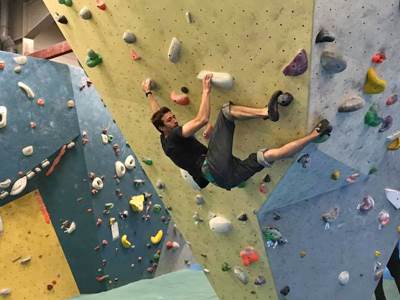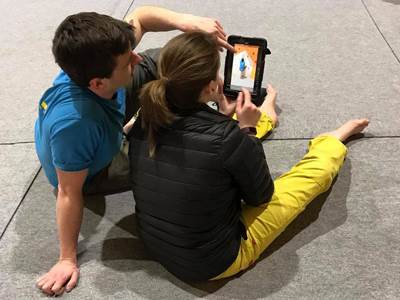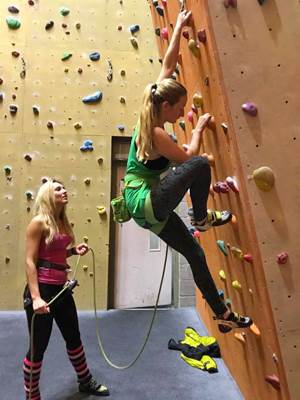The value of a coach
By Iain McKenzie
There are plenty of ways to describe what it means to be psyched: being driven… passionate… dedicated… having an inner fire… wanting it… or just RARRRRR!
In any sport being psyched is an essential part of success, never more so than in climbing. It’s the difference between just showing up and plodding along, and fighting for every last ounce of finger and arm strength while you are onsighting at your limit. This is where a coach can help you perform to your best.
If we are to break motivation down, the driving factors would fall into two categories:
Intrinsic, coming from within, our internal driving forces.
Extrinsic, all the external factors and forces that can drive us.

As climbers we are affected by both intrinsic and extrinsic factors and they’re not always positive: rubbish weather (extrinsic) can ruin our mood (intrinsic) if we can’t get out climbing, bad days at work, the wall is too busy, too hot, too cold, too many midges, not feeling it, niggles, too reachy, too bunched up, too run out… the list could go on.
Climbing is a massive head game and for many of us it takes very little to knock the intrinsic psych, which is why climbers often work on their strengths and climb their favourite styles, because it is more likely to lead to a positive experience. In order to improve, however, you need to be able to channel that intrinsic psych and work on your weaknesses because it is this that ultimately drives performance.
Coaching can help with this struggle because a coach can break down your climbing performance (at whatever level you climb) to work out what your weaknesses are and what motivates you to improve. This will enable them to tailor their delivery, specific to your needs, in a fun an engaging way.
All climbers have a desire to climb better – improving is part of what makes climbing fun and its individual to everyone which makes climbing so unique. However, desire on its own is not enough. Everyone has a desire, it’s the will to prepare to climb harder and get better that matters.
Getting assistance from a coach is not the magic blue pill but it can go a long way to giving you an unbiased honest opinion. A quick Google search brought up an interesting quote:
“
The coach's role is to create the environment and to provide the opportunity for the client to express their motivation in all they do. It is the coach's role to support them and to inspire them to feel confident in themselves. Motivation is a really important aspect of a successful coach.” (Four roles and responsibilities of sports coaches by Andres Ramirez)

Motivation goes hand in hand with goal setting. By setting small, achievable goals, people start to get it into their heads that they can succeed. They break the habit of failing and begin to get into the habit of succeeding.
Goal setting is a dynamic process that the coach will be flexible with; not all ideas will work. A coach will talk to and understand the climber’s needs and they will aim to set realistic goals considering lifestyle and all the things that go on outside of the wall that can affect training.
This process can take time, it won’t just happen! Relationships, needs and motivations all count towards the goals and these take time to build and establish.
It is possible to set your own goals without any external input, but this process can focus too much on all the physical elements, especially if it’s not guided by an experienced coach, such as how many pull ups or press ups you can do. Climbing strength is important but it’s always relative to the level at which you climb and focusing on it in isolation doesn’t address the technical, tactical or psychological elements of climbing such as route reading and visualisation, which may actually be the reason you are failing.
As coaches we also observe, monitor and look for the variables. As climbers we get comfortable in what we can do and very rarely step outside of that zone for fear of failure, which in some circumstances could be costly! Since we don’t observe ourselves climbing, it’s easier to stick with what we know.

External observation is the key to improvement. Alex Ferguson gave an insight into observing players at Manchester United, “
What you can pick up by watching is incredibly valuable… Seeing a change in a player’s habits or a sudden dip in his enthusiasm allowed me to go further with him: Is it family problems? Is he struggling financially? Is he tired? What kind of mood is he in? Sometimes I could even tell that a player was injured when he thought he was fine. I don’t think many people fully understand the value of observing. I came to see observation as a critical part of my management skills. The ability to see things is key — or, more specifically, the ability to see things you don’t expect to see.” (Sir Alex Ferguson meeting with Harvard Business School professor Anita Elberse to discuss coaching.)
So as coaches, by observing and giving you the tools to put the effort in it can go a long way to improving both your psych and hopefully your performance. As a coach it’s extremely satisfying to see that transformation take place.
The brilliant thing is that the external factors are changeable; the weather will get better, the wall will be less busy and the lump of rock will still be there. So if you’re always psyched and always improving, life is good! If, on the other hand, you struggle with either or both of those things, getting some coaching can make a real difference. Your psyched self will thank you.
Iain McKenzie is a Mountain Training Development Coach who provides high quality coaching services for all levels of climber from the absolute beginner through to British Champions in Boulder, Lead and Speed. Iain is also a qualified Personal Trainer which enables him to enhance climbers' strength, flexibility and fitness.